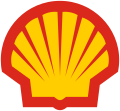Shell plc
Shell plc is a British multinational oil and gas company headquartered in London.[5] Shell is a public limited company with a primary listing on the London Stock Exchange (LSE) and secondary listings on Euronext Amsterdam and the New York Stock Exchange. A core component of Big Oil, Shell is the second largest investor-owned oil and gas company in the world by revenue (after ExxonMobil), and among the world's largest companies out of any industry.[6] Measured by both its own emissions, and the emissions of all the fossil fuels it sells, Shell was the ninth-largest corporate producer of greenhouse gas emissions in the period 1988–2015.
For other uses, see Shell.Formerly
GB00BP6MXD84
- Royal Dutch Petroleum Company (1890)
- The Shell Transport and Trading Company (1897)
April 1907 (as Royal Dutch Shell)
20 July 2005 in Shell Centre, London (current entity)
Worldwide
- Andrew Mackenzie (chairperson)

- Wael Sawan (CEO)

- Jiffy Lube
- Pennzoil
- Quaker State
- Shell Advance
- Shell Broadband
- Shell Helix
- Shell Nautilus
- Shell Rimula
- Shell Rotella
- Shell V-Power
![]() US$316.6 billion (2023)[3]
US$316.6 billion (2023)[3]
![]() US$37.3 billion (2023)[3]
US$37.3 billion (2023)[3]
![]() US$19.6 billion (2023)[3]
US$19.6 billion (2023)[3]
![]() US$406.3 billion (2023)[3]
US$406.3 billion (2023)[3]
![]() US$188.4 billion (2023)[3]
US$188.4 billion (2023)[3]
90,000 (2023)[4]
-
- Shell Australia
- Shell Canada
- Shell Chile
- Shell Hong Kong
- Shell India
- Shell Italia
- Shell Nigeria
- Shell Oman
- Shell Pakistan
- Shell Philippines
- Shell South Africa
- Shell Tunisia
- Shell US
Shell was formed in April 1907 through the merger of Royal Dutch Petroleum Company of the Netherlands and The "Shell" Transport and Trading Company of the United Kingdom. The combined company rapidly became the leading competitor of the American Standard Oil and by 1920 Shell was the largest producer of oil in the world.[7] Shell first entered the chemicals industry in 1929. Shell was one of the "Seven Sisters" which dominated the global petroleum industry from the mid-1940s to the mid-1970s. In 1964, Shell was a partner in the world's first commercial sea transportation of liquefied natural gas (LNG).[8] In 1970, Shell acquired the mining company Billiton, which it subsequently sold in 1994 and now forms part of BHP. In recent decades gas has become an increasingly important part of Shell's business[9] and Shell acquired BG Group in 2016.[9]
Shell is vertically integrated and is active in every area of the oil and gas industry, including exploration, production, refining, transport, distribution and marketing, petrochemicals, power generation, and trading. Shell has operations in over 99 countries,[10] produces around 3.7 million barrels of oil equivalent per day and has around 44,000 service stations worldwide.[11][12] As of 31 December 2019, Shell had total proved reserves of 11.1 billion barrels (1.76×109 m3) of oil equivalent.[13] Shell USA, its principal subsidiary in the United States, is one of its largest businesses.[14] Shell holds 44%[15] of Raízen, a publicly-listed joint venture with Cosan, which is the third-largest Brazil-based energy company.[16] In addition to the main Shell brand, the company also owns the Jiffy Lube, Pennzoil and Quaker State brands.
Shell is a constituent of the FTSE 100 Index and had a market capitalisation of US$199 billion on 15 September 2022, the largest of any company listed on the LSE and the 44th-largest of any company in the world.[17] By 2021 revenues, Shell is the second-largest investor-owned oil company in the world (after ExxonMobil), the largest company headquartered in the United Kingdom, the second-largest company headquartered in Europe (after Volkswagen), and the 15th largest company in the world.[18] Until its unification in 2005 as Royal Dutch Shell plc, the firm operated as a dual-listed company, whereby the British and Dutch companies maintained their legal existence and separate listings but operated as a single-unit partnership. From 2005 to 2022, the company had its headquarters in The Hague, its registered office in London and had two types of shares (A and B). In January 2022, the firm merged the A and B shares, moved its headquarters to London, and changed its legal name to Shell plc.[5][19]
Shell is mainly owned by institutional investors. The 10 largest shareholder of Shell plc. in early 2024 were:[94]






